I don’t see why there’s friction between documentarian Alex Gibney and director George Hickenlooper over the use of the term “Casino Jack” in the titles of their respective Jack Abramoff films. HIckenlooper’s film, a feature starring Kevin Spacey as Abramoff, is called Casino Jack, and Gibney’s is called Casino Jack: The United States of Money. I can tell the two apart easily. Both could play Sundance 2010…maybe.
Daily
Gilroy + Hurt Team
A Hurt Locker q & a was moderated last night by director-screenwriter Tony Gilroy following a 6 pm screening at Manhattan’s DGA theatre. (l. to r.) Gilroy, Hurt Locker director Kathryn Bigelow, screenwriter Mark Boal, costar Anthony Mackie, and…I’m sorry but I didn’t write down the name of the bearded guy on the right. It could have been producer Nicolas Chartier or associate producer Jack Schuster or producer Greg Shapiro. No disrespect intended.
It’s been 14 months since I first saw The Hurt Locker at the ’08 Toronto Film Festival. And it’ll be a topic of interest for the next three and a half months, presuming it gets nominated for Best Picture, Bigelow gets nominated for Best Director, and Boal snags a Best Original Screenplay nomination. (Which will probably happen.)
“Set in Baghdad and the full maelstrom of that godforsaken conflict, this is a full-power throttle, nail-biting, bomb-defusal suspense film that gradually becomes a kind of existential nerve ride about the risk and uncertainty of everything and anything,” I wrote on 9.8.08. “The Hurt Locker is absolutely a classic war film in the tradition of Platoon, The Thin Red Line, Pork Chop Hill, Paths of Glory and the last 25% of Full Metal Jacket.”
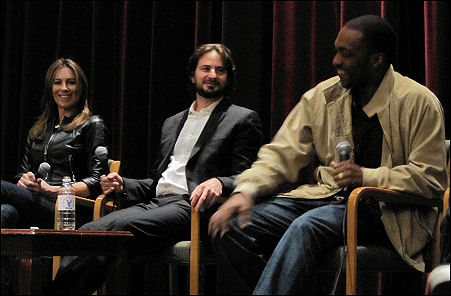
(l. to r.) Bigelow, Boal, Mackie — Thursday, 11.12, 8:50 pm.
No Dodge
“Defense Lawyer: Fort Hood Shooter Could Be Paralyzed” (11.13 AP story). HE reaction: That’s a start. This is straight out of the Glenn Beck playbook and I’m sorry, but Maj. Nidal Malik Hasan must swing for this. If he doesn’t, the crowd in the Place de Concorde will make their feelings known.
Roadblock
Dead Time Warner wifi in the apartment with the repair guy not able to visit until next Tuesday. ATT air-card wifi on the laptop spotty at best and randomly disconnnecting whenever it feels like it. An urgent visit to the local post office required due to curious refusal of postman to leave letters addressed to me here, and a screening of Crazy Heart at 11 am in Manhattan. I have all this good stuff to post but I know when I’m temporarily beaten. All she wrote until mid-afternoon.
Detective #1: “I think God hates me.” Detective #2: “Hate him right back. Works for me.” What film? Easy one.
Bayou Fruitloop
It’s not that I’ve discounted Nicolas Cage’s loop-dee-loop jazzman performance in Werner Herzog‘s Bad Lieutenant: Port of Call New Orleans. For an actor whose stock in trade is to convey varying degrees of derangement whatever the role, Cage hits a 21st Century high as Lt. Terence McDonagh — a wackazoid refrain of Cage’s legendary Peter Loew in Vampire’s Kiss.
To truly commune with an inspired Cage performance is to drop a tab of mescaline, jump off a 700-foot cliff in Yosemite National Park and howl like a coyote all the way down.
I’ve presumed all along that Academy voters would most likely undervalue (or even dismiss) Cage’s Lieutenant performance because it’s too Miles Davis, too much in the realm of instinct and mad brushstrokes. But maybe I’m wrong. It would be nice — hell, glorious! — if I am.
Say Again?
I had a nice, friendly, off-the-record lunch today with Hurt Locker director Kathryn Bigelow at Extra Virgin on West 4th. She’s in Manhattan for a day or two, and is sitting for a q & a with director-writer Tony Gilroy this evening at the DGA theatre on West 57th. On 11.30 Bigelow will be handed a tribute award at the 19th annual Gotham Independent Film Awards. The org has also nominated Hurt Locker for Best Feature, Best Ensemble Performance and Best Breakthrough Actor (i.e., Jeremy Renner).
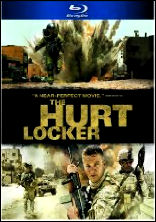

The DVD/Bluray comes out January 12th. If Summit is smart they’ll put the film back into NY and LA theatres starting next month.
Anyway after Bigelow left and I was putting my coat on I asked the Extra Virgin waitress if she’d seen The Hurt Locker. “The what?,” she said. “The Hurt Locker. An Iraq movie, bomb-squad defusing.” Her face was a blank. “Is it a documentary?,” she asked. “Nope, feature…a thriller,” I said. “Who’s in it?” she said. “Jeremy Renner, Ralph Fiennes, Anthony Mackie….that’s okay, just wondering,” I said.
Intrigued, I walked into the main room and asked the hostess and (I think) another lady employee who was sitting at the bar if they’d seen it. Same reaction — neither woman had even heard the title.
And we’re not talking about waitresses in some greasy spoon in Pensacola, Florida. New Yorkers are supposed to be moderately hip and aware. It’s one thing for these women not to have seen an Iraq War film, but to draw a total blank at a mention of the title? This obviously says nothing about the quality of the film, and almost everything about the lackluster marketing effort by Summit.
Honored
Gamechangers.com’s Mike Bonifer has written a nicely thought-through HE tribute, calling yours truly the October 2009 game-changer of the month. Except his piece was just posted today, 11.12. Why wait 12 days after the end of October to announce this honor? I should either be the November game-changer guy or Bonifer should have run this 30 days ago. Or…whatever, he should have waited until next April.
The site is a promotion for Bonifer’s book, “Gamechangers: Improvisation for Business in the Networked World.”
The Hook
If you’ve ever played in any kind of half-assed blues band, which I did for a year or so (as a barely competent drummer), you know that the band has to have a half-assed blues band name. The one I played in was called the Sludge Brothers. The thinking was that “sludge” sounded authentic on some level; it also sounded like Flatt and Scruggs. A variation of this same band adopted a different name — Dog Breath — for a special one-night gig. It was stolen from Frank Zappa, of course.
But the band never adopted the greatest blues-band name I ever heard — Blind Pig Sweat. I heard it spoken exactly once in my life by someone other than myself, but I never forgot it. Whatever this quality is, it’s something you want in any name, title, etc.
Through The Roof?
Today’s (11.12) tracking has Roland Emmerich‘s 2012 with an 87 total awareness, a 49 definite interest and 30 first choice-and-release. That means pretty damn big. Maybe tsunami level. Variety says that box-office observers are forecasting over $40 million and perhaps higher. I say high 40s at least and perhaps a nudge over $50 million.
McKee + Horror Genre = Forget It
Vanity Fair.com‘s Jason Zinoman recently went the distance with Robert McKee‘s screenwriting course. He was”genuinely hoping to learn about screenwriting,” he writes, “but also, as a critic — and a specialist of horror movies — with a professional interest in McKee’s theories about genre and narrative.”
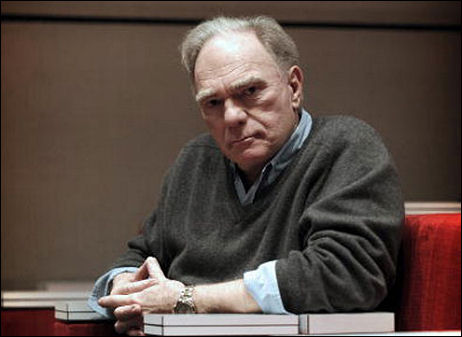
Legendary screenwriting guru Robert McKee
“By the end of the day, I had learned some valuable lessons about show business, the art of persuasion, and the tricky relationship between truth and fiction. I’d also learned that Robert McKee often has no idea what he’s talking about.
“Some people believe that no course can teach you how to write a screenplay, that it just comes out of you, but in my opinion that’s not true. A good teacher can really help writers, and McKee surely has had some success. He’s been criticized for turning the creative process into a series of rules, but this misses the real problem with his course, namely that the rules themselves are often banal and arbitrary. The emperor here is not naked, but he is showing some skin through his loosely tied robe, and when the subject turns to horror, the silky-smooth garment collapses around his ankles.”
Split Fox Verdict
You can respond to Fantastic Mr. Fox as an auteurist thing — a dazzling and charming representation of the mind and spirit and stylistic exactitude of director Wes Anderson — and as a movie you pay to see with an $8 tub of popcorn in your lap. I responded to it both ways — in effect with two heads. Which left me feeling great and not-so-great.
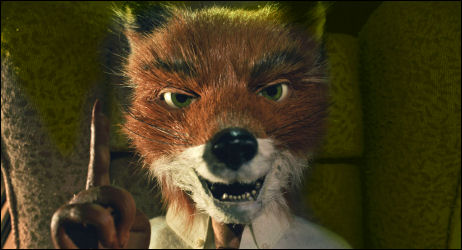
I loved and worshipped the auteurist aspect — the luscious autumnal colors, the every-other-frame movement that Anderson and his team used to create Fox’s particular stop-motion look, the “moving” fox hair that resulted from this, the deadpan Anderson humor, Mr. Fox’s courdoroy wardrobe, the tasteful pop-tune soundtrack (Brian Wilson‘s “Heroes and Villains,” “The Ballad of Davy Crockett”) and all the other typical Andersonian goodies. But I was unmoved and even disappointed by the campfire movie aspect.
The fact that 95% or 96% of the paying public will be responding to the latter and not caring all that much about the former (despite the fact that the elites — guys like Kent Jones, Village Voice critic Scott Foundas, New York‘s David Edelstein and New Yorker critic/columnist Richard Brody, among several others — are tickled with delight) may result in a commercial problem for 20th Century Fox, the distributor.
Edelstein calls it “a dandy’s movie,” and that it is. Which, as noted, is what gives my inner movie dweeb such pleasure. I intend to buy, watch and occasionally re-watch the Fantastic Mr. Fox Bluray when it comes out next year. But most American moviegoers are not dandies. They’re slugs and lugs, and I know, trust me, what’s going to happen when they watch it on screens this weekend.
It’ll be the same reaction I was sensing from the swells last month during the London Film Festival premiere in Leicester Square. During the early stages they’re going to go “yeah, yeah, this is glorious, really good, immaculate craft, wonderful colors and details” and so on, but somewhere around the 45- or 60-minute mark they’re going to begin saying to themselves, “Wait a minute, what is this? Nothing’s happening. It’s staying on the same level.”
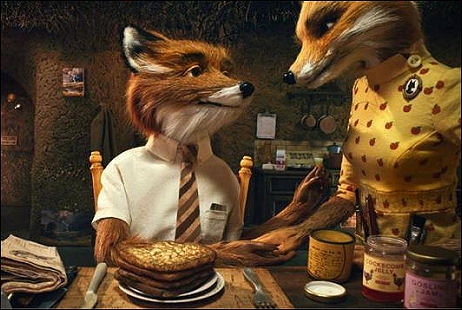
The bottom-line thematic truth about Fantastic Mr. Fox is that it’s about as deep as a Road Runner cartoon. It’s all about how it looks and sounds and how they made it, and nothing about what it actually is. It’s pure Wes, pure whimsy, pure style, pure technique, pure stone-skimming-across-the pond. I get it and I love it, but my inner meathead was saying “yeah, and so what?”
Based on the Roald Dahl children’s book, Fantastic Mr. Fox is about the troubles and turmoils that befall a sophisticated adult fox (George Clooney‘s Mr. Fox) and his family (Meryl Streep, Jason Schartzman) when he decides that a life as a gentleman newspaper columnist isn’t enough — he must revert to raiding coops and eating chickens.
Mr. Fox and and his opossum friend Kylie (Wally Wolodarsky) decide to raid the farms and warehouses of three ruthless agribusiness types — Boggis, Bunce and Bean (Michael Gambon). The story is basically about Fox and friends enjoying the upper hand against these three, and then Boggis, Bunce and Bean striking back with machine guns and John Deere super-diggers and whatnot, and then the Fox clan figuring some way around their latest maneuver, etc.
Except it’s not “real.” The immutable laws of probability and outcome don’t apply. No foxes get killed despite ridiculous automatic-weapons odds against them. (It’s a little bit like Sylvester Stallone never being winged in Rambo II.) Life can sometimes be brutal in actuality and sometimes very tough decisions have to be made, and sometimes people stumble and fall and die and go to jail, but in Fantastic Mr. Fox life is an ironic bullshit thing…a hip romp…a lightweight goof.
Mr. Fox is chicken-raiding behind the back of Mrs. Fox (Streep) as he’s promised her he won’t attack and slaughter any more, despite the fact that he and Mrs. Fox are shown doing a chicken-raid in the opening scene. Presumably Mr. Fox collects a handsome salary as a newspaper columnist (enough to afford a nice home inside a big tree) and when it comes to vittles he and Mrs. Fox presumably go to a fox supermarket to buy frozen chicken paties. The main point is that hunting is out.
Except none of this is explained or explored, and it struck me as more than a little bit wacko. The common lore of foxes is that of chicken-coop raiders — it’s what they do. (They actually hunt and eat rodents, snakes, you name it. They eat about 2 pounds of food each day.) So what kind of screwy-headed fox wife tells her fox husband that he has to give up chickens, like he’s some kind of alcohol or gambling or oxycontin addict? I don’t get it. In fact, I reject it. It’s just not a very persuasive or compelling story.
I mean, what’s the metaphor here? That it’s cool to be a thief, or that thieves have to be true to their natures? That it’s good to have family and friends to help you steal chickens and apple cider? I didn’t hate the story but what is it? Nothing, really.
In short the Fantastic Mr. Fox style is great to savor in dozens of aesthetic ways, as noted, but in rudimentary terms it’s just a mild-mannered outdoor Anderson picnic. It’s Clooney having fun portraying a canny, urbane, ethically-challenged fox and Schwartzman doing his usual young-neurotic guy, nobody-values-me shtick. And Murray being glib and cool. And Owen Wilson coming in for a brief cameo, and Anderson voicing a weasel, and Willem Dafoe playing a rat.
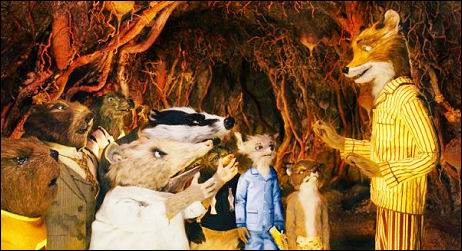
Compare the whimsy in Fantastic Mr. Fox to the rich thematic delivery in WALL*E or Up or The Incredibles, and you’re talking about a very minor thing. I’m sorry but the Anderson decline continues. I want that old Bottle Rocket/Rushmore current back. And if I can’t have that I want more than just dandified style. I want Wes to remake Jean Luc Godard’s Weekend, or make some kind of 21st Century film noir or….I don’t know but some kind of bold-swan-dive-into-fresh-territory type of film.
Honestly — if Fantastic Mr. Fox wasn’t directed by Anderson and didn’t feature the voices of Clooney, Streep, Schwratzman and Bill Murray (playing a badger), would anyone be paying attention to a film like this at all? I wonder.
And yet I love the way it’s all been done. It’s a huge kick on that level. Really. So if you can watch it from that inner sanctum and stay there and keep yourself from slipping into a sweaty and bothered state after the 45-minute mark (like me), you’ll have a very cool time with it. And you can meet Kent Jones and David Edelstein and Scott Foundas and Richard Brody for drinks afterwards. Cool all around. Movie happiness is where you find it.
